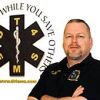When teaching or speaking about violence, one of the most important pieces to the culture-change puzzle is pressing charges.
In nearly every class I have taught, inevitably someone pipes up and asks, “Why press charges, the prosecutor won’t do anything anyway?” I immediately address it by asking what experience has the person had with pressing charges for a work-related attack.
The provider usually then describes an incident where an assault took place, charges were pressed and the attacker received a sentence less than that of what he was charged with.
Welcome to “the system.”
As a police officer I can assure you, many suspects arrested for various crimes were able to walk out before I could even get my paperwork completed. That did not stop me from doing my job, nor did it deter my frustration for how “the system” works.
Then during the judicial process, a suspect would sometimes plead guilty to some crime other than what he was arrested for. It took me a while to understand, but once I got past the black and white of the situation, I got it. “The system” is not perfect, but it works.
Here are three ways pressing charges will help change a culture.
1. It will teach media outlets about the frequency of assaults on staff.
2. It will teach police officers to understand the limitations of our training for violence on the job.
3. It will teach prosecutors and judges about the frequency of violence directed at staff.
Media
Every single reporter who has interviewed me asks, “Why do you think there is an increase in violence against staff?” My reply: “There isn’t an increase, it is just getting recognition now.”
Reporters have been just as shocked as the layperson when they see the numbers. But violence isn’t personal until it is in your own backyard. You see, many newspapers still cover small towns. A local reporter goes into the police department and asks for a dispatch log for the police blotter in the paper that talks about which officer was dispatched to what incident.
If your local paper started covering incidents of assaults because a police report was made, the average civilian would begin to realize the dirty little secret exists.
Police
With little to no training in the use of force, many in EMS and fire personnel have learned by watching officers use hands-on techniques against a resisting subject. This dangerous learning method has led to a vicious cycle.
Providers “help” officers restrain a person; the officer also learns, although mistakenly, that providers have some sort of training. This in turn leads to officers turning over people that medical staff have little-to-no training to handle should they turn violent.
The provider, knowing only the physical side (not the when it is OK to take action and when it is not) can then try to take “custody” of a person they were originally supposed to be treating under “consent.”
Prosecutors and judges
Every single prosecutor I have met would entertain a report filed by a health care provider regarding assault. When I am told stories by staff of a lack of support, I call the prosecutor myself.
I’m always told they would support the victims of a violent crime. Whatever plea agreement is reached once a case is in court is out of our hands. But just because a person is placed on probation does not mean he got off scot-free.
I am asking you to press charges. Use “the system” to make emergency medicine better and safer for those who follow us in this desire to help others in a medical or traumatic emergency.


